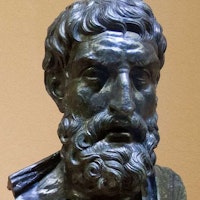No one is too young or too old to know what happiness is. No matter your age, taking care of the health of your soul is good.
No one is too young or too old to know what happiness is. No matter your age, taking care of the health of your soul is good.
Epicurus

What Happiness Is
Theme: Happiness and Well-being
No one is too young or too old to know what happiness is. No matter your age, taking care of the health of your soul is good.
Saying that the season for dedicating to your own happiness has not arrived or that it is already too late is like saying that the time for happiness has not yet come or that the age for being happy is already gone.
Instead, both young and old, you should dedicate yourself to knowing what happiness is; so that while aging you may feel young by virtue of the happiness that has been, while if you are young, you may grow stronger with it and get ready to not fear the future.
So you should try to recognize those things that make you happy, since if happiness is with you, you will not look for anything else; but if it is not with you, you would do anything to gain it.
Epicurus, born in February 341 BC on Samos, Greece, became a significant figure in Hellenistic philosophy. Educated under the influence of Anaxagoras, he moved to Athens and later established his own school, "The Garden," focusing on simplicity, friendship, and a life removed from political strife. His philosophy advocated for intellectual over physical pleasures and emphasized a peaceful, self-sufficient existence. Despite being misunderstood during his time, Epicurus's emphasis on happiness and well-being profoundly influenced subsequent thinkers, including Thomas Jefferson.
His philosophy, Epicureanism, prioritizes happiness through ataraxia—peace from fear—and aponia—the absence of pain. Epicurus distinguished between temporary pleasures and the enduring happiness from living without pain or fear. He highlighted the importance of friendship for security and tranquility and advocated for a rational, empirical understanding of the world to overcome irrational fears, especially concerning gods and death, proposing a practical approach to a fulfilling life.
Epicurus's teachings on leading a content life, emphasizing simple pleasures and the value of friendship, have outlived him, remaining influential until the 4th century AD and beyond. Despite being misrepresented, his insights into achieving happiness have left a lasting legacy, guiding many through the centuries towards a contemplative and contented existence. His work invites us to reflect on the nature of happiness and the pursuit of a life marked by intellectual fulfillment and mutual support.
Letter to Menoeceus
Epicurus. "Letter to Menoeceus." The Great Classics of Philosophy Revisited for an Easier Interpretation: Letter On Happiness, translated by Alessandra Bottacin, GoodMood, 2015.

Epicurus
Theme: Happiness and Well-being

About This Epicurus Quotation From His “Letter to Menoeceus” [Commentary]
Epicurus’s exploration of happiness in his “Letter to Menoeceus” redefines it as a lifelong pursuit, open to all ages. By saying, “No one is too young or too old to know what happiness is,” he challenges the idea that happiness is bound to a certain life stage. Instead, he presents it as a state of well-being cultivated through inner care and self-reflection, accessible to anyone who prioritizes their soul’s vitality. This view counters the tendency to see happiness as elusive, reminding us it is within reach for those who nurture their inner life.
Epicurus encourages both young and old to recognize what truly brings them fulfillment, fostering a foundation for lasting contentment. His vision of happiness isn’t bound to youthful pleasures or the wisdom of old age but grows as we age. This approach sees happiness as a cultivated practice, resilient enough to withstand the passage of time, and encourages individuals to reflect on their personal sources of joy as a strength against life’s uncertainties.
By advising us to “recognize those things that make you happy,” Epicurus champions a balanced approach to well-being rooted in self-awareness and inner peace. He suggests that with happiness present within, life’s external pursuits lose urgency, enabling a fuller embrace of the present. For Epicurus, true happiness is less about chasing material goals or constant pleasure and more about fostering a deep satisfaction from within. This timeless insight into well-being advocates for a life enriched by reflection and a steady sense of contentment aligned with one’s own nature.
Additional Commentary About Epicurus
Resources
Related Quotes
Copyright © 2017 – 2026 LuminaryQuotes.com About Us